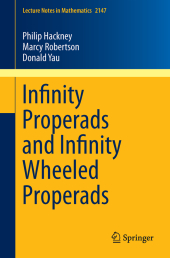 Neuerscheinungen 2015Stand: 2020-02-01 |
Schnellsuche
ISBN/Stichwort/Autor
|
Herderstra▀e 10
10625 Berlin
Tel.: 030 315 714 16
Fax 030 315 714 14
info@buchspektrum.de |

Philip Hackney, Marcy Robertson, Donald Yau
(Beteiligte)
Infinity Properads and Infinity Wheeled Properads
1st ed. 2015. 2015. xv, 358 S. 213 SW-Abb. 235 mm
Verlag/Jahr: SPRINGER, BERLIN; SPRINGER INTERNATIONAL PUBLISHING 2015
ISBN: 3-319-20546-3 (3319205463)
Neue ISBN: 978-3-319-20546-5 (9783319205465)
Preis und Lieferzeit: Bitte klicken
The topic of this book sits at the interface of the theory of higher categories (in the guise of ( ,1)-categories) and the theory of properads. Properads are devices more general than operads and enable one to encode bialgebraic, rather than just (co)algebraic, structures.
The text extends both the Joyal-Lurie approach to higher categories and the Cisinski-Moerdijk-Weiss approach to higher operads, and provides a foundation for a broad study of the homotopy theory of properads. This work also serves as a complete guide to the generalised graphs which are pervasive in the study of operads and properads. A preliminary list of potential applications and extensions comprises the final chapter.
Infinity Properads and Infinity Wheeled Properads is written for mathematicians in the fields of topology, algebra, category theory, and related areas. It is written roughly at the second year graduate level, and assumes a basic knowledge of category theory.
Introduction.- Graphs.- Properads.- Symmetric Monoidal Closed Structure on Properads.- Graphical Properads.- Properadic Graphical Category.- Properadic Graphical Sets and Infinity Properads.- Fundamental Properads of Infinity Properads.- Wheeled Properads and Graphical Wheeled Properads.- Infinity Wheeled Properads.- What┤s Next?.
"This monograph gives a very nice and complete presentation of the theory of -properads and -wheeled properads. ... This book is very well written, motivated and almost self-contained. It should be of high interest for people working in homotopy theory and higher categories." (David Chataur, Mathematical Reviews, December, 2016)


